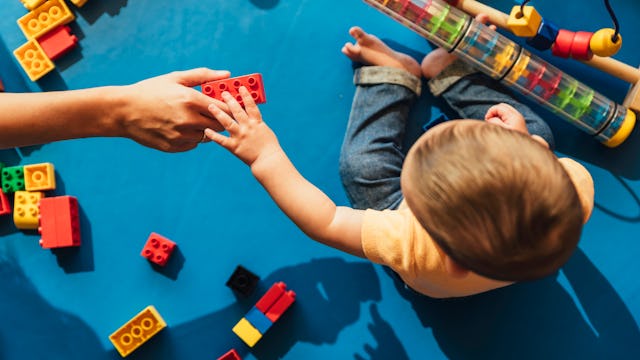Controlling 'Helicopter' Parents Can Leave Kids Unable To Manage Their Emotions

Study proves helicopter parenting doesn’t help kids learn to handle their emotions
A new study is proving that parents who hover and stay overly involved in their kids’ play as toddlers create children who later struggle to manage their emotions. Because if someone is always telling you what to do and how to feel you never have to figure that out for yourself.
Dr. Nicole Perry and colleagues in both the United States and Switzerland documented their findings in Developmental Psychology about the effects of overly controlling “helicopter” parents and also, over-involved parents. The team observed 422 two-year-olds taking a look at mother involvement during a play session. The mom and toddler were given toys in a lab setting and told to play for four minutes and then spend two minutes putting the toys away. The researchers took note of “to what degree the mothers took over.”
The study recorded how often the mom inserted herself into play by showing the child what to do or how to act. The research continued for the next eight years tracking kids through grade school and recording data about their mental and emotional well-being. Researchers asked their teachers to rate each kid on a range of possible issues including depression, loneliness, anxiety, and grades along with thoughts on each subject’s social skills.
The results? Pretty overwhelming.
Helicopter parenting is solidly linked to “children having less control over their own emotions and less control over their impulses by the age of five.” Five-year-olds who struggled with controlling their emotions had “worse social skills at the age of 10.” So that means things only got worse as the years went on. The study results also suggested a link between overly involved parents and “more emotional problems and poorer attitude to school.”
In an interview with The Guardian, Dr. Perry says, “To foster emotional and behavioral skills parents should allow children to experience a range of emotions and give them space to practice and try managing these emotions independently and then guide and assist children when [or] if the task becomes too great.”
This sounds like common sense, but it can prove difficult for some parents to back the hell up and let their kids feel things, no matter how unpleasant. It starts when they’re teeny and you see them struggling to fit the round peg into the square hole in that little shape sorter toy. I know I used to intervene at times with my first baby because I hated to see her grow frustrated when her earnest efforts yielded no results. But over time, (and with her baby brother keeping me too busy to hover) I learned the benefits of backing off. If she wasn’t left to her own devices, to experience frustration and failure and then find her own way out of it, my jumping in to save her would only cause her to stop developing those skills on her own. If I’m always there, helicopter blades whirring, she learns nothing.
Dr. Janet Goodall from the University of Bath sums it up perfectly. “What is really important is that [parents] care about their children, and what their children are doing and what their children are learning.”
This article was originally published on